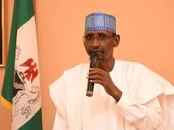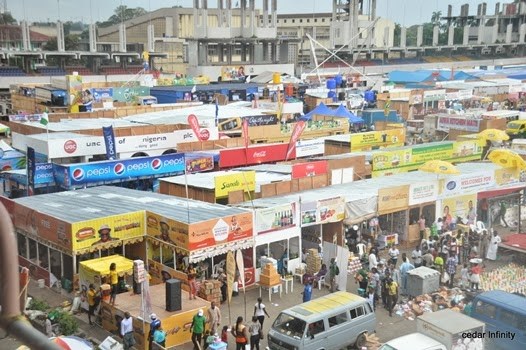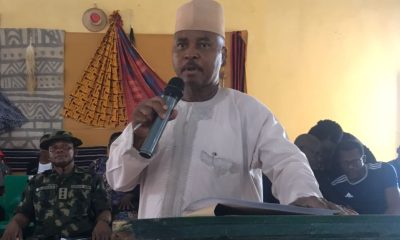Economy
FCT Ministry Embarks on Reforms to Enhance Ease of Doing Business in Abuja.

The Ministry of Federal Capital Territory (FCT) has initiated reforms to encourage establishment and growth of Small and Medium Enterprises in the nation’s capital.
Malam Muhammad Bello, the FCT Minister, disclosed this on Thursday in Akure at the opening of a stakeholders’ retreat organised by the FCT Internal Revenue Service.
Report says that the retreat is to harmonise and inaugurate a system of revenue collection to facilitate the ease of doing business in the Federal Capital Territory.
Bello, represented by the Permanent Secretary, FCT, Mr Olusade Adesola, said the reform would entail the implementation of a digital platform to be called the FCT Business Portal for the issuance of permits, licenses, and approvals.
He explained that the digital platform would allow businesses and individuals to apply for and receive all necessary permits and licenses online, without the need for physical visits to government offices.
“In addition, we are working to streamline and simplify regulations and procedures for business registration, property registration, and land use planning.
“These reforms will help to create a more transparent, predictable, and efficient regulatory environment for businesses,” he said.
Bello, however, said that none of the proposed reforms could be successful without the support and cooperation of all stakeholders.
He stressed the need for active participation and engagement of businesses, investors, and civil society organisations to ensure that the reforms were effective, inclusive and above all sustained.
“I say this because in the next few weeks the administration of President Muhammadu Buhari will exit after the conduct of a free, fair and transparent election and hand over to a new administration.
“The need for continuity will be brought into even sharper focus and this can only be achieved by the collective resolve of all to ensure that this happens.
“In conclusion, I would like to emphasize that the harmonisation of revenue and promotion of ease of doing business in the FCT are not just technical or administrative issues.
“They are critical components of our efforts to create a more prosperous, inclusive, and sustainable Capital Territory for all.
“By working together, we can overcome the challenges we face and build a brighter future for the FCT and its residents,” the FCT Minister said.
Bello expressed the hope that the retreat would bring together the broad spectrum of stakeholders to rub minds and exchange ideas on how best to ensure to attain the highest IGR generating sub-national status.
“It is my utmost delight, therefore, to see so many relevant stakeholders from across the country here this morning and I have no iota of doubt that you will meet the objectives for which you have organised this programme,” he said.
Declaring the retreat open, Gov. Oluwarotimi Akeredolu of Ondo State, described revenue generation as critical and crucial to sustainable socioeconomic development of any society, especially in a developing economy.
Akeredolu, who was represented by Mr Wale Akinterinwa, the state Commissioner for Finance, said that the Akeredolu-led Administration met a politically motivated tax system and a non- functioning Board of Internal Revenue
“Today, we can boldly say that we have changed the Internally Generated Revenue narratives of the state without introducing extra burden on our citizens,” the governor said.
The Executive Chairman, FCT-IRS, Mr Haruna Abdullahi, said that the vision of the body was to establish a world-class revenue collection system in the FCT that is transparent, accountable, and efficient.
Abdullahi also explained that the aim of the FCT-IRS was to achieve this by creating a single, unified platform and dashboard that would enable it to track and monitor all revenue generated in the FCT.
“Our goal is to ensure that all revenue in FCT is properly accounted for and reported, with the highest level of transparency and accuracy.
“This will help to build trust and confidence among the people and encourage them to support our revenue generation efforts.
“We also aim to use technology to streamline our revenue collection processes, reduce inefficiencies, and improve service delivery to the people.
“Ultimately, we believe that by achieving our vision, we can create a vibrant and prosperous FCT that will be the envy of the nation,” he said.(NAN)
Economy
Customs Zone D Seizes Contraband Worth N110m

The Nigeria Customs Service (NCS), Federal Operation Unit (FOU), Zone D, has seized smuggled goods worth over N110 million between April 20 till date.
The Comptroller of Customs, Abubakar Umar, said this at a news conference on Tuesday in Bauchi.
He listed the seized items to include 11,200 litres of petrol; 192 bales of second hand clothing, 140 cartons of pasta, 125 pairs of jungle boots, 47 bags of foreign parboiled rice and 9.
40 kilogramme of pangolin scales.Umar said the items were seized through increased patrols, intelligence-led operations, and strengthened inter-agency collaboration.
The comptroller said the pangolin scales would be handed over to the National Environmental Standards and Regulations Enforcement Agency (NESREA) for appropriate action, while the seized petrol would be auctioned, and the proceeds remitted to the federation account.
He attributed the decrease in smuggling activities of wildlife, narcotics, and fuel to the dedication and professionalism displayed by the personnel in line with Sections 226 and 245 of the NCS Act 2023.
The comptroller enjoined traders to remain law abiding, adding the service would scale up sensitisation activities to combat smuggling.
“We remain resolute in securing the borders and contributing to Nigeria’s economic development,” he said.
The FOU Zone D comprises Adamawa; Taraba, Bauchi, Gombe, Borno, Yobe, Plateau, Benue and Nasarawa. (NAN)
Economy
Trade Tensions: Global Economy Stands at Fragile Turning Point -UN

The UN Department of Economic and Social Affairs (UN DESA) has said that the global economy stands at a fragile turning point amid escalating trade tensions and growing policy uncertainties.UN DESA, in a report published on Thursday, stated that tariff-driven price pressures were adding to inflation risks, leaving trade-dependent economies particularly vulnerable.
It stated that higher tariffs and shifting trade policies were threatening to disrupt global supply chains, raise production costs, and delay key investment decisions – all of this weakening the prospects for global growth. The economic slowdown is widespread, affecting both developed and developing economies around the world, according to the report.For instance, in the United States, growth is projected to slow “significantly”, as higher tariffs and policy uncertainty are expected to weigh on private investment and consumer spending.Several major developing economies, including Brazil and Mexico, are also experiencing downward revisions in their growth forecasts.China’s economy is expected to grow by 4.6 per cent this year, down from 5.0 per cent in 2024. This slowdown reflects a weakening in consumer confidence, disruptions in export-driven manufacturing, and ongoing challenges in the Chinese property sector.By early 2025, inflation had exceeded pre-pandemic averages in two-thirds of countries worldwide, with more than 20 developing economies experiencing double-digit inflation rates.This comes despite global headline inflation easing between 2023 and 2024.Food inflation remained especially high in Africa, and in South and Western Asia, averaging above six per cent. This continues to hit low-income households hardest.Rising trade barriers and climate-related shocks are further driving up inflation, highlighting the urgent need for coordinated policies to stabilise prices and protect the most vulnerable populations.“The tariff shock risks hitting vulnerable developing countries hard,” Li Junhua, UN Under-Secretary-General for Economic and Social Affairs, said in a statement.As central banks try to balance the need to control inflation with efforts to support weakening economies, many governments – particularly in developing countries – have limited fiscal space. This makes it more difficult for them to respond effectively to the economic slowdown.For many developing countries, this challenging economic outlook threatens efforts to create jobs, reduce poverty, and tackle inequality, the report underlines. (NAN)Economy
FG To Finalize N1.5trn Road Concession Project- Edun

The Minister of Finance and Coordinating Minister of the Economy, Mr Wale Edun, says the Federal Government will soon finalise N1.5 trillion road concession project.
Edun made the statement during a meeting with some private sector investors in Abuja on Wednesday.
He said that the government was on the verge of finalising the landmark N1.
5 trillion road concession project, launched in 2021 under the Highway Development and Management Initiative (HDMI).The minister said that the initiative aimed to involve private sector partners in the reconstruction and management of nine major highways across the country, spanning approximately 900 kilometers.
He said that the partners had almost completed all arrangements for the highways, which they would finance, rebuild, and maintain under 25-years concession agreements.
Edun said that the concessionaires were expected to recoup their investments through tolling fees.
“We met the concessionaires who have virtually concluded all the agreement arrangements for nine roads, nine major highways, which they are contracting to refinance the rebuilding of and to recover their funds from tolling fees under 25-year or so agreements.
“And we met them to iron out the remaining administrative obstacles for the kicking off construction of these roads,” he said.
Edun said that the substantial private sector investment would bridge budgetary gaps.
He added that it would also allow investors to undertake revenue-generating projects, leveraging their expertise and resources for long-term implementation and maintenance.
“Thereafter, it will be a question of signing the addendums and moving to the site.
“As you know, already the 125-kilometer Benin–Asaba Highway concession agreement has been signed. The addendum has been signed.
“All arrangements have been finalised, in fact, the ministry of works have handed over the road to the concessionaires.
“They have already started the preliminary arrangements for reconstruction of that road in place of a 10 lane highway.
“It is an investment, it’s a project and an initiative that will reduce the travel time between Benin and Asaba right up to the Niger Bridge,” the minister said.
Edun said that the Benin–Asaba Highway project, which has already commenced, is expected to reduce travel time between Benin and Asaba from four hours to one hour, significantly enhancing productivity and efficiency in the region.
He described the HDMI, launched in 2021, as a strategic programme by the federal government aimed at attracting private sector investment to improve Nigeria’s federal road network.
Edun said that the initiative seeks to address the challenges of inadequate funding and maintenance by leveraging Public-Private Partnerships (PPP) to develop and manage road infrastructure.
Under the HDMI, 12 highways were initially selected for concession, covering a total of 1,963 kilometers.
These roads include Benin–Asaba, Abuja–Lokoja, Kano–Katsina, Onitsha–Owerri–Aba, Shagamu–Benin, Abuja–Keffi–Akwanga, Kano–Shuari.
Others are Potiskum–Damaturu, Lokoja–Benin, Enugu–Port Harcourt, Ilorin–Jebba, Lagos–Ota–Abeokuta, and Lagos–Badagry–Seme roads.
The minister said that the initiative was projected to generate over 50,000 direct and 200,000 indirect jobs, contributing significantly to the country’s economic growth and development.
The Minister of Works, Engineer David Umahi who joined the meeting virtually reassured the private sector partners on the HDMI of the federal government commitment.
He said that everything possible would be done to resolve the contending issues, adding he will soon be back to address all pending issues.
One of the concessionaires, Mr Kola Karim, representing Shoreline, emphasised the need for right and enforceable documents stipulating the takeoff and handover dates, which would attract investors to invest their funds.
Other private sector partners also requested for the addendum to the original agreement to be signed that would enable toll sections of the completed highways while work was in progress on other sections.
They noted that each concessionaire has unique challenges that should be dealt with accordingly.
Also in the meeting were Minister of Budget and Economic Planning, Abubakar Bagudu, and the Director General Infrastructure Concession and Regulatory Commission (ICRC), Dr Jobson Ewalefoh




























